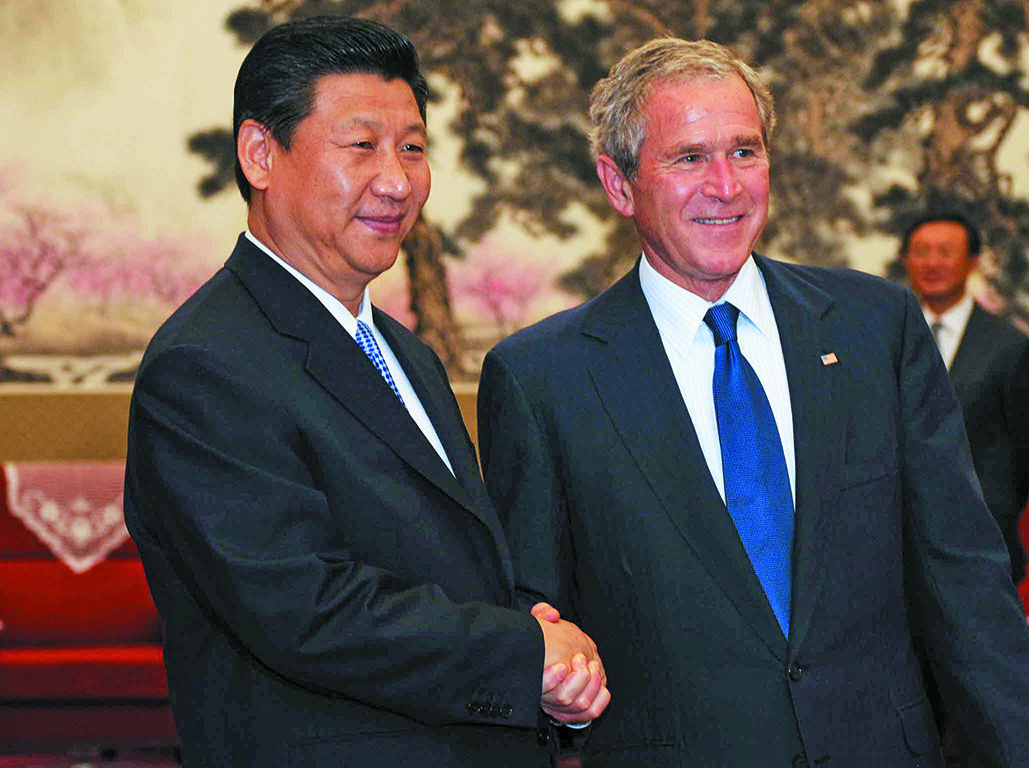The Graveyard of Failed Geopolitical Forecasts

The Graveyard of Failed Geopolitical Forecasts
“So many centuries after the creation, it is unlikely that anyone could find hitherto unknown lands of any value.” That is what the head of the Spanish Royal Commission wrote in 1486, advising King Ferdinand to reject an exploration proposal by one Christopher Columbus.
In early 1792, British Prime Minister William Pitt the Younger justified drastic cuts to the country’s military, saying: “[U]nquestionably there never was a time in the history of this country when, from the situation of Europe, we might more reasonably expect 15 years of peace, than we may at the present moment.”
In 1956, Soviet Leader Nikita Khrushchev told representatives of capitalist nations: “[S]ocialism will, in the long run, conquer capitalism. Such is the logic of the historical development of mankind.” In 1964, he said socialism’s future victory over capitalism was “as certain as the rising sun.”
These were all highly educated, well-informed, powerful individuals making earnest predictions about the way global affairs would play out—and getting it precisely wrong: an entire New World of hitherto unknown lands laid over the horizon, decades of war began mere weeks after Pitt’s speech, and Soviet-style socialism, at least, died about 30 years ago.
Individuals get it wrong, but so do entire modern geopolitical theories, formed, studied and believed by large numbers of the brightest minds around the world.
‘The End of History’
After the Berlin Wall fell, leading to the collapse of the Soviet Union and the end of four decades of Cold War, United States State Department official Francis Fukuyama famously proclaimed that the world had reached “the end of history.” His thesis stated that mankind had attempted all plausible types of government and a clear winner had emerged: Western liberal democracy. It represented, Fukuyama wrote, “the end point of mankind’s ideological evolution—the final form of human government.”
The West had won. The continued spread of liberal democracy, individual freedom and popular sovereignty was inevitable. The sun would set on authoritarianism, and the era of great powers warring against each other was over.
President George H. W. Bush’s 1990 address to Congress echoed Fukuyama’s sentiments, hailing a future “free from the threat of terror, stronger in the pursuit of justice, and more secure in the quest for peace.” Mankind was entering a “new world … quite different from the one we have known, a world where the rule of law supplants the rule of the jungle.”
The “end of history” was a thrilling hypothesis, and became a near instant hit among analysts and policymakers across the West.

U.S. military, economic and cultural power was at its zenith, the spread of republican democracy was certain, so the U.S. lost interest in the rest of the world and drifted off to sleep. Throughout the 1990s, largely due to reduced demand, television networks and newspapers slashed foreign news coverage by two thirds. “Young adults cared more about the Zone Diet than the subtleties of Middle East diplomacy,” Joseph Nye writes in The Paradox of American Power. And many American leaders “became arrogant about our power, arguing that we did not need to heed other nations. We seemed both invincible and invulnerable.”
Political observer Kishore Mahbubani said widespread belief in Fukuyama’s forecast “did a lot of brain damage,” and as a result, “the West went on autopilot.”
During these “autopilot” days, the 9/11 terrorist attacks hit America like a bolt from the blue. A few years later, Vladimir Putin’s Russia invaded the former Soviet nation of Georgia, bringing a large chunk of its territory back under Moscow’s control. His 2014 invasion of Ukraine and annexation of its Crimean Peninsula was even more dramatic.
Many Western leaders couldn’t believe their eyes. “Russia is on the wrong side of history,” U.S. President Barack Obama said, apparently in denial that Fukuyama’s forecast had failed. “[I]n the 21st century, the borders of Europe cannot be redrawn with force.”
But Russia had just redrawn them. Secretary of State John Kerry seemed equally perplexed by how “history” could be happening in an age when it was supposed to have ended. “It’s really 19th-century behavior in the 21st century,” he said.
Meanwhile, the Arab Spring and Ukraine’s Orange Revolution failed to achieve their pro-democracy aims, the Syrian civil war mutated into proxy battles between major powers, India and Pakistan locked in a nuclear standoff, Iran and Saudi Arabia engaged in proxy war in Yemen, Iranian zealots systematized their terrorist chaos, and around the world populism and authoritarianism returned with a vengeance.
It turned out that history—tangled, unjust, retrograde, violent, ugly human history—did not end in 1989.
The ‘China Fantasy’
“The more we bring China into the world,” U.S. President Bill Clinton said in 1993, “the more the world will bring change and freedom to China.” His Republican successor, George W. Bush, echoed the sentiments in 1999, saying, “Trade freely with China, and time is on our side. Economic freedom creates habits of liberty. And habits of liberty create expectations of democracy.”
This forecast was popular throughout the 1990s and into the early-2000s. Western business moguls and politicians of all stripes believed China’s integration into the global economy and its increasing prosperity would cause the nation to liberalize its repressive and authoritarian political ideologies. They believed the ruling Chinese Communist Party would be forced to adopt responsible domestic and international behavior and eventually democracy. A truly free and democratic China would benefit the whole world. This prompted Westerners to pursue policies of engagement with China on all levels, including welcoming it into the World Trade Organization.

The West’s near-universal optimism was identified by Los Angeles Times correspondent James Mann as the “China fantasy.”
By 2010, China had grown much stronger and richer, but barely freer. Then, in 2012, Xi Jinping became China’s leader and began reversing what minuscule reforms the nation had made.
Xi used China’s increased strength from engaging with the West to tighten the Communist Party’s stranglehold on the nation—and to boost his own power to staggering levels. He clamped down on the media and silenced activists. He disappeared hundreds of human-rights lawyers and thousands of dissidents, and detained more than a million Chinese citizens in concentration camps. He nixed constitutional term limits on his rule, clearing the way for him to control China for the rest of his life. And he made clear that in international trade, China served only the interests of the regime—viciously so.
The “China fantasy” foresaw the dynamics exactly wrong: Chinese integration into the international system generated greater authoritarianism, a more tightly closed political structure, and a far more vengeful and powerful enemy of the West.
The ‘India Counterweight’
In the late 2000s, as it was becoming clear that the “China fantasy” was collapsing and that Beijing’s rising power and geopolitical ambitions were cause for concern, America began looking for help in constraining the dragon it had awakened. India’s military and economic power, geographic location, status as the world’s largest democracy and historic rivalry with China made it appear to be the perfect nation for the job.

To fashion India into a security counterweight to China, the Bush administration began selling the nation prized nuclear technology. Arms control advocates decried the decision, but the prospect of having a strong India as a democratic bulwark to China was too enticing, so the sales proceeded. The Obama administration continued the courtship, expanding U.S.-India trade ties and further boosting security cooperation.
Western optimism for the theory abounded. It was perhaps best articulated by the Heritage Foundation in 2011: “[T]he complex challenge presented by a rising China will inevitably drive the U.S. and India to elevate ties and increase cooperation across a broad range of sectors in years to come.”
But in 2014, China’s main partner, Russia, unlawfully annexed Crimea, and President Obama said the nations of the world were “largely united” in viewing the move as illegal. And after all the Bush and Obama administrations had done to curry favor with India, the expectation was that it would back the U.S. position.
Instead, India shocked the world by joining China and supporting Russia.
In the years since, India has increasingly defied the West and leaned toward the Russia-China axis: It has joined the China-led Shanghai Cooperation Organization, it has purchased huge quantities of Russian weapons in violation of U.S. sanctions, and it has conducted a series of military exercises with Russia and China. And Indian Prime Minister Narendra Modi has held a series of milestone personal meetings with Putin and Xi, which the Diplomat called a signal of “monumental change with regard to the post-Cold War status quo.”
With each of these purchases, war drills and meetings, it becomes clearer that the India counterweight theory has sunk.
‘Declaring the End From the Beginning’
Myriad other hypotheses, theories and models predicting the future of world events have come into vogue in recent decades: Moral Consensus theory, Oil Imperialism, Voluntary Unificationism, the Import Substitution Industrialization theory, Neo-Ottomanism and Islamic Democracy theory, the Democratic Peace theory, the Russian Reset, Structural Adjustment and the list goes on.
All have been subsequently discredited by the course of actual events, and have been buried in the graveyard of failed geopolitical forecasts. Even mankind’s best and brightest minds consistently fail to foretell the course of global affairs.
But there is someone who reliably reveals what is coming.
Isaiah 46:9-10 quote the Creator God making an extraordinary statement: “… I am God, and there is none like me, Declaring the end from the beginning, and from ancient times the things that are not yet done, saying, My counsel shall stand, and I will do all my pleasure.”
Unlike men whose prognostications usually age like milk, God knows precisely what is on the horizon in global affairs. He can say something, and then thousands of years later bring it to pass. And in His instruction manual for mankind, the Holy Bible, He offers a remarkable amount of detail regarding specific nations in the modern day and how they will interact with each other. He gives a guide to end-time international relations.
A student of Bible prophecy would never have bought into the India counterweight forecast because Ezekiel 38, using ancient names for modern India, says the nation would ultimately partner not with the U.S., but with Russia and China. (Read “Is India in the Bible?”)
Neither would a prophecy student have believed the “China fantasy,” because Luke 21 reveals that during the “times of the Gentiles”—the end-time era when China and other non-Israelite nations dominate global affairs—“men’s hearts” will be “failing them for fear.” This is not a nation whose rise should have ever been hastened and celebrated. (See Gerald Flurry’s article “The Climax of Man’s Rule Over Man.”)
A Bible prophecy reader would also have avoided being lulled to sleep by “the end of history.” Numerous Bible passages forecast a third world war that will be fought with nuclear weapons and make all mankind’s previous wars look like playground skirmishes. Matthew 24:21-22 state: “For there will be greater anguish than at any time since the world began. And it will never be so great again. In fact, unless that time of calamity is shortened, not a single person will survive” (New Living Translation). This war will be by far the bloodiest chapter in mankind’s history, and in the lead-up to it, major historic events such as 9/11 and Crimea should not catch us unawares. (Request a free copy of Mr. Flurry’s booklet Nuclear Armageddon Is ‘At the Door’)
A study of the Bible shows that one third of it is prophecy. Around 90 percent of those prophecies concern our modern age. Tomorrow’s news—about the U.S., Britain and Israel, the nations of Europe, the Middle East, and Russia, China and India—has already been written!
These prophecies are inspired by the omniscient God, and their accuracy is stunning. Numerous specific prophecies have already come to pass, proving both the existence of the Almighty God and that the Bible was divinely inspired. And these fulfilled prophecies should give us faith in the accuracy of the forecasts that have not yet happened.
The language of Scripture sometimes sounds archaic to the modern ear, and the symbolism in prophecy is sometimes obscure. Even many people who believe that the Bible is God’s Word think prophecy is so coded and mysterious that it cannot be comprehended.
But prophecy can be understood. You can know when the “last days” are, and who “Rosh” and “Magog” and “Cush” and “Assyria” and “Ephraim” and “Manasseh” are. That is why these prophecies have been recorded in the first place. That is why they have been miraculously preserved for thousands of years.
The God of the Holy Bible keeps His promises, including His prophecies. He is a God who follows through. “God is the originator of prophecy,” writes Trumpet editor in chief Gerald Flurry in his booklet Daniel Unlocks Revelation. “The Father has a deep prophetic understanding that no other being has.”
Mr. Flurry goes on to explain that when we study prophecy, we must honor the Father who originates and reveals it. We must remember that all the prophesied geopolitical events mainly point to God’s love, to the soon-coming return of Jesus Christ and to the God Family. “Prophecy is of no profit if it doesn’t have God’s love!” he wrote. “Without love, understanding all the prophecy in the world means nothing. … Christ is going to come and rule forever! That’s what we need to get excited about most of all …. Our focus must be on knowing God ….”
His incredible revelation.

